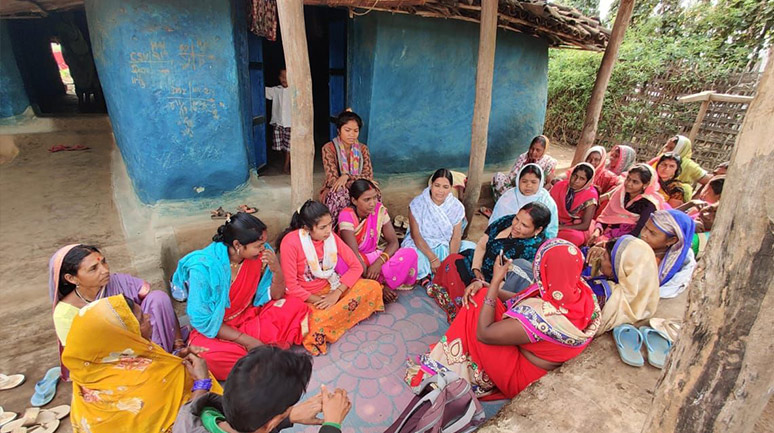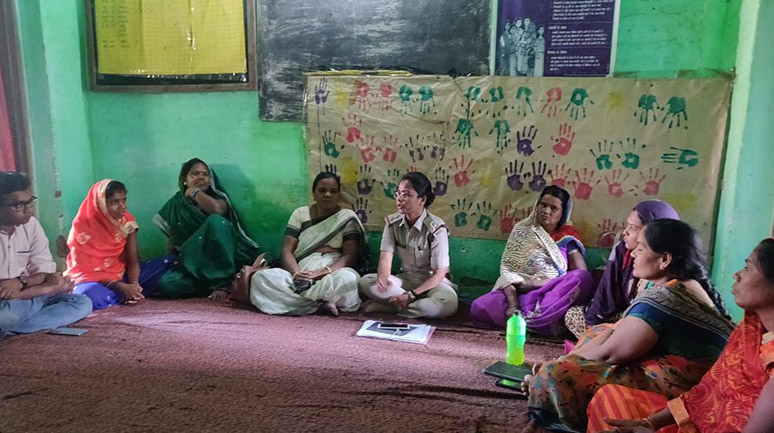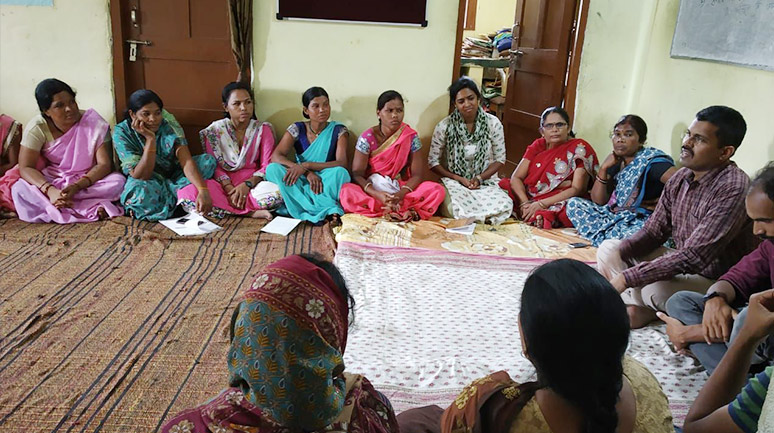The Narmada Mahila Sangh Paralegal System: In Quest of a Sustainable Model to Address Gender Violence


Generating livelihoods and alleviating poverty is one aspect of rural upliftment; the other challenge is to create awareness of gender equality, rights and justice among women. The battle against patriarchy and tradition is a long drawn one and, although a system has been put in place in Betul, the challenge is to find the financial resources to keep it going
I f mobility is a parameter to assess the degree of liberty a woman has, the poorest of the poor, that is, the rural, tribal woman can be seen as the most independent one. Rural, tribal women access public and private spaces more often than women from other religions, caste or class identities. According to the Census 2011 data and the 2019 National Crime Records Bureau (NCRB) data, Madhya Pradesh has the highest percentage of total scheduled tribes (14 per cent) and, ironically, the highest number of rapes of tribal women. This data reveals that despite women being able to exercise their constitutional right to liberty to some extent, their situation is not any better than other states of India—a country, of which the crime rate against women (87 rapes per day) is in itself a reflection of the pathetic status of women’s safety.
The situation is more or less the same with women in the poverty prone district of Betul, a district where girl trafficking incidents is one of the highest. Narmada Mahila Sangh (NMS)—a Federation of 15,000 marginalized women’s collectives—has been working in Betul since 2009. It started with organizing women into community institutions, working for the development of the villages such as ensuring the effective functioning of government institutions at different levels, ensuring people’s access to state public services, creating alternative livelihood opportunities such as poultry. PRADAN’s gender sensitization trainings with NMS members led to the NMS recognizing gender disparities in a woman’s ecosystem. The prevalence of domestic violence in many households resulted in NMS members raising their voice against different atrocities. Realizing the need of the hour, NMS redefined its purpose to work on gender equality strategically in 2012. To support its members to access justice against atrocities, NMS started its paralegal service the same year. It capacitated 12 paralegals for the cause.
The NMS paralegal system:Purpose and functions
NMS has been providing support to poor, gender-based, violence survivors in accessing justice through its paralegal service.
NMS functions through collectives institutionalized in three tiers: the SHG (a collective of 10–12 members), the village organization, VO (all the SHGs in a village) and the Federation. These three tiers play a significant role in the process of handling the case of a survivor by paralegals. The filing of every case follows a designed process, as described in Table 1.
Process of Filing a Case
A case first gets registered in the NMS either during a Federation meeting, a village-level committee (VLC) meeting, a Cluster meeting or an SHG meeting. A survivor or the representatives of the SHG/VLC or anyone on behalf of the survivor submits a written application to the Federation, which adjudges the viability of the particular case before accepting or declining it.
The Federation’s Village Representatives (VR) forum/Management Committee (MC) in its monthly meeting allots the case to a particular paralegal, to handle the matter.
Counselling is the first point of interaction between the paralegal and the survivor. Through this process, the paralegal tries to address the distress of the survivor and provides basic legal information. Following this, the survivor is expected (by way of being more equipped) to define the way forward to address the issue.
This meeting tries to make the survivor, more specifically the woman, aware of the situation and mobilizes support in her favour. The village-level meeting sometimes acts as a forum for conflict resolution. However, the village-level meeting is an optional step, depending on the choice of the survivor.
The legal process, that is, filing of the FIR/Missing report is initiated. The SHG members and the paralegal accompany the survivor to the police station. A separate file is also maintained, in NMS, in which the case is documented and the case movement registered.
The monthly meeting of paralegals reviews the cases held by each paralegal and discusses further ways to help the survivors. This review meeting is headed by a representative of the MC. The VR’s forum is then given updates on the progress of each case by the MC representative.
After accepting the application and depending upon the situation, the Federation extends support to the survivor. Sometimes, the Federation supports the survivor till the case gets registered in court or when the trail starts; if required, the Federation extends support till the survivor gets justice. When the Federation considers that the case is concluded or has reached its logical end, this is communicated to the VR forum. After getting the forum’s nod, the Federation formally closes the case. The NMS issues an explanatory note, duly attested by the MC, on why it thinks the case is closed/logically concluded, to the survivor and the concerned VO.
*In cases involving rape and human trafficking, in which immediate action is required, with the consent of the survivor, filing the FIR precedes the other steps. Further formalities are completed later.
*In a few cases, in which power and solidarity need to be showcased, the Federation takes collective action, as the situation demands, either through protests or by approaching duty bearers en masse.
The process is efficient in bridging the gap between a violence survivor and the state policies safeguarding women rights. These state policies are interventions at the macro-level of the women’s ecosystem. NMS realized that only when the community recognizes the need and has the urge to participate in implementing state policies can a policy be successful.
To transform an area into a violence-free space for women, interventions at every level—self, formal and informal institutions such as family and panchayat—are needed. In order to influence the women and these institutions, paralegals have been creating awareness about gender violence; sensitizing villagers and the police about gender discrimination; connecting the victims of gender violence to the local administration, the police and the legal services; and providing financial and moral support to victims.

The Sub-inspector of Shahpur police station, Betul, MP, at a Narmada Mahila Sangh Federation meeting, planning a village-level awareness camp on gender violence.
Creating awareness of gender-based violence
R ealising how rampant, and often invisible, gender-based violence is among the villagers, NMS began the process of creating awareness about it. Although their girls, often minors, were being trapped in the human trafficking racket, the families of these missing girls did not bother to search for their daughters because they believed their daughters had eloped with their lovers, thereby bringing shame to their families. Another practice largely accepted by the villagers of Betul, as in other parts of the country, was that of husbands abusing their wives, physically and emotionally.
NMS set out to help villagers understand that all these accepted behaviors violated women’s basic human rights and are crimes. NMS paralegals perform street plays, popularly known as ‘The theater of the oppressed’, on topics of gender-based violence. After one of the many performances on a missing minor girl, which depicted the horrifying reality of sexual, physical and economic assault that girls, who have been trafficked, face, the parents of three missing girls filed missing reports in local police station. Subsequently, with the support of the paralegals the girls were rescued and returned to their villages.
Human trafficking, domestic violence and rape were the themes explored in The Theatre of the Oppressed plays. The aim was to sensitize the villagers by depicting the suffering women endured and to educate them on their rights as enshrined in the law and state policies for the protection of women’s rights.
Creating awareness through gender training
After five years of suffering domestic violence, Seeta (name changed) finally filed an FIR against her abusive husband. Seeta reports that the gender trainings helped her identify how she had been oppressed since birth whereas she deserved a dignified life. This realization enhanced her confidence and she filed the FIR.
NMS, with the support of PRADAN, organizes different trainings on gender and patriarchy in the villages, with a purpose of raising women’s consciousness on their right to dignity, by building their understanding on the existing gender disparities and its causes. The gender trainings include different aspects of gender discrimination such as gender roles in the household and farm work; control over women’s mobility; ways in which women are oppressed, etc.
Gender awareness programs and trainings by NMS paralegals, along with counseling of the victims of such violence, have given women the strength and confidence to approach the police to file cases against their perpetrators.
Accessing the legal system
Like many in India, who have a patriarchal mindset, many in the Indian police too have the same perspective. It takes a lot of courage for a woman to go against societal norms and approach the police. Very often, the police advise the victims to compromise and to prioritize their families over their dignity and persuade them not to file FIRs. Faced with such advice by the state machinery, women get demotivated and hesitate to stand up for their rights.
Receiving similar complaints against the police, NMS paralegals started accompanying women survivors to the police station and ensured filing of FIRs. The paralegals also accompany the survivors during court hearings, giving them moral and legal support.
Mobilizing support for survivors
Women victims, who take legal action against their families, are usually looked down upon by the villagers. Paralegals organize village-level meetings in the VO with the victim’s consent and let the villagers (mainly the village-level women’s collectives) know about the victim’s side of the story. Paralegals counsel the victim’s families. Through conversations and counseling, paralegals try to mobilize moral and financial support for the victims.
Paralegals use the platform of the village-level meetings to inspire more women to stand upagainst gender atrocities.

The Superintendent of Police, Betul, and NMS representatives discussing collaboration strategies to reduce atrocities against women in the district at the NMS office in Betul.
Financial support for survivors
All the clients of NMS are marginalized people and a few of them do not even have the money needed to reach the police station and court. In a few cases, the victims need immediate medical care and yet cannot access it because they do not have the money to cover their costs. In such pitiable situations, NMS has been providing financial support to the survivors.
The role of the paralegals
Starting with convincing the parents of missing girls in Kundin village through the Theatre of the Oppressed in 2012 to filing missing reports to approaching the state women’s commission for the delay by the police to take action, NMS paralegals have rescued 20 missing girls so far. Domestic violence was not of concern to society thus far. The paralegals mobilized the local women’s collective to support the aggrieved women against the perpetrators. NMS has been able to create a support system for women victims and has given its support to more than 65 domestic violence survivors so far.
| No. | Type of case / Progress | Domestic Violence | Girl Trafficking/Missing | Rape/Attempt to Rape | POCSO | Others | Total |
| 1 | No. of cases | 65 | 20 | 12 | 1 | 35 | 133 |
| 2 | Solved | 45 | 10 | 9 | 1 | 24 | 89 |
| 3 | In progress | 4 | 4 | 3 | 11 | ||
| 4 | Abandoned by survivor | 16 | 6 | 3 | 8 | 33 | |
| No of paralegals engaged | 11 | ||||||
- Others’ include cases of physical abuse, suicide, murder, property fraud, infidelity, availing of insurance benefits on accidental death, etc.
T he NMS paralegal system has been recognized and appreciated for its work by the local police administration of the district. Paralegals now get appointed as Counselors in the district family counseling centers. They have been supporting the local police in the investigation process of woman/girl trafficking and missing cases in the area. The NMS paralegal system is not a parallel system to the state police: it supports it.
To reinforce the villagers’ faith in the local police, the Federation took the initiative of inviting the local sub-inspector to attend the VO/VLC meetings and speak about the Domestic Violence Act. As a result, the women, who used to be afraid to approach the police, now feel more confident to speak with them.
NMS has not only been able to create a movement against domestic violence in the villages but the gender training programmes by paralegals have also been successful in bringing behavioural change in individuals such that now men have begun to participate in household chores equally and women find a space in village-level meetings that was hitherto mainly male-dominated. Bound by their superstitions and blind beliefs, earlier the tribal community resisted post mortem being conducted on a dead body, something that is a necessary part of any investigation. Paralegals have been creating awareness on this and have been successful in influencing the local community; now there is acceptance of the process to some extent.
Future plans
The NMS plans to move forward on many gender-related aspects by:
- Having more shelter homes for domestic violence victims at the block level
- Sensitising the police about counselling women victims of violence
- Organizing awareness camps on gender-based violence in villages
- Investing in capacity building of community institutions
- Providing support to survivors in accessing justice
Impediments
W hereas the system has been successful on the outside, it has its challenges. It is struggling to sustain itself today. The victims/survivors of violence and the paralegals, who provide support, belong to economically marginalized backgrounds. Neither the NMS, being a non-profit Federation, nor the victims can bear the cost of paralegals. Their services are usually paid for by PRADAN.
According to the 2019 NCRB data, the number of gender-based violence cases has increased in the state; in the villages too, the scenario is similar. Although the NMS has a very wide outreach, the number of victims raising their voice against atrocities and approaching NMS have reduced. The call for support has diminished. In order to bring about behavioural change in women victims so that they will stand against atrocities, long-term, consistent investment of resources is required. The lack of financial resources and lesser investment in promoting and facilitating women's rights programmes has had a direct impact, leading to fewer cases being reported.
In addition, as shown in Table 2, more than 25 per cent of women survivors have abandoned their legal process half way because of the lack of financial resources to meet their legal costs and the unavailability of social security to the survivor. The NMS paralegals aspire to address these challenges.


4 Comments
A journey from 2012 to 2021 is comprehended beautifully.
How the efforts of NMS’s paralegals have brought the often ignored issues of atrocities against women to the surface but not just bringing them to surface , also dealing with them in a planned and systemic manner at all levels added the very decision of NMS to engage around this issue with this intensity is commendable and inspiring.
The future plan says having more shelter homes for victims and survivors at block level.
Is NMS managing any shelter homes as of now?
No, as of now NMS isn’t. Although NMS aspire to but it don’t have financial resources for the same. It is trying to influence the state to have more shelter homes at block level.
Unique approach and great execution to empower women. This can be a brilliant case study for other organisation to work on women empowerment.
PRADAN and the author should document and publish more of their work to inspire the development community.